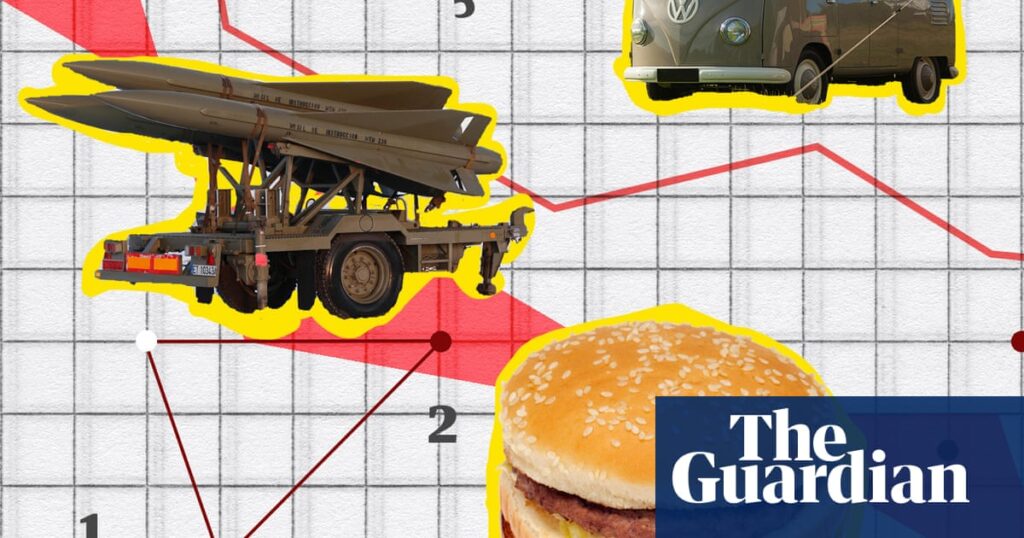
Welcome to the latest edition of The Crunch, where we delve into the intricate web of global dependencies and environmental impacts shaping our world today. This week, we explore Europe’s reliance on US military supplies, the environmental repercussions of Australia’s gas projects, and the varied summer holiday trends across Europe.
Europe’s Military Dependence on US Supplies
In an era where European nations are striving for strategic autonomy, a new analysis reveals a stark reality: European militaries remain heavily reliant on US-made weapons and equipment. This dependence raises questions about the feasibility of European-led rearmament initiatives, especially as NATO allies face mounting pressure from the US to increase their defense spending.
According to data analyzed by The Guardian, the majority of military stockpiles in Europe are sourced from the United States. This reliance not only underscores the transatlantic defense ties but also highlights the challenges Europe faces in developing its own defense capabilities.
The visual analysis by Alex Clark illustrates the source of arms sales to European countries over the years, contextualizing the US’s push for increased military spending by NATO members.
As European nations navigate the complexities of defense procurement, the reliance on US arms could have significant strategic implications. Experts suggest that diversifying military suppliers could enhance Europe’s strategic autonomy and reduce dependency on external powers.
Environmental Impact of Australia’s Gas Project
Meanwhile, in Australia, the government’s decision to extend the North West Shelf gas project on the Burrup Peninsula has sparked environmental concerns. Approved in May by the Labor government, the extension allows the project to operate for an additional 40 years, from 2030 to 2070.
Woodside’s North West Shelf project is one of the world’s largest liquefied natural gas ventures. The extension is projected to result in approximately 87.9 million tonnes of carbon dioxide equivalent emissions annually, once the gas is exported and burned.
This figure places the project’s emissions on par with those of entire countries, raising significant environmental and ethical questions about Australia’s commitment to reducing greenhouse gas emissions.
Environmentalists argue that extending such projects undermines global efforts to combat climate change. The decision has prompted calls for more sustainable energy policies and investments in renewable energy sources.
Summer Holiday Trends Across Europe
As summer approaches, Europeans are gearing up for their annual holidays, with distinct patterns emerging across the continent. A visualization by Sebastian Gräff from the European Correspondent highlights when holiday peaks occur in different European countries.
Northern European nations tend to start their holidays earlier, with vacation periods spread out over several weeks. In contrast, southern European countries often have more concentrated holiday periods, typically occurring later in the summer.
Northern European countries go on holiday earlier, with breaks more spread out, while southern European countries go on holiday later, and with holiday times more concentrated over the same weeks.
These trends reflect cultural and climatic differences, influencing everything from tourism patterns to economic activity during the summer months.
Inflation and Global Economic Dynamics
In the realm of economics, the “inflation burger” has captured attention for its insightful depiction of how multinational corporations navigate complex financial landscapes. This award-winning piece from ABC News illustrates how companies manipulate intellectual property payments to shift profits offshore, a practice that has significant implications for global economic dynamics.
Such practices highlight the challenges regulators face in ensuring fair taxation and economic transparency. As inflation continues to impact economies worldwide, understanding these dynamics becomes increasingly important.
The winners of the Information is Beautiful awards have been announced, and this piece from the ABC in Australia took out the silver in the Business Analytics category.
As we continue to explore these pressing issues, it is clear that global interdependencies, environmental challenges, and economic complexities are intricately linked, shaping our world in profound ways.
Stay informed and engaged with The Crunch as we bring you the most important stories and data visualizations from around the globe.







